July 23, 2024: IHS Updates for Tribes and Tribal and Urban Indian Organizations
This bi-weekly update provides up to date information on recent events, meetings, conferences, upcoming deadlines, and recognition of the work being done across the Indian Health Service, other federal agencies, and Indian Country. For more information or questions, email IHSPublicAffairsStaff@ihs.gov.
Site Visits Across the IHS Oklahoma City Area
Last week, IHS Director Roselyn Tso traveled to Kansas and Oklahoma to visit with tribal leaders and IHS staff, who are all doing their part to help fulfill the IHS mission of providing the highest level of health care throughout Indian Country. During her visit to Kansas, Ms. Tso had the opportunity to meet staff at the Haskell Indian Health Center and tour their facility. It's located in Lawrence, on the edge of Haskell Indian Nations University, and reflects a rich diversity of Native cultures.
As Ms. Tso continued her site visits, she met with staff at the Prairie Band Potawatomi Health Center. Located in Mayetta, Kansas, they have a longstanding commitment of providing quality health care services to their patients. The facility continually promotes quality and excellence, which includes a nationally accredited lab for its rigid standards for daily operations and demonstrated accuracy in proficiency testing. Ms. Tso praised the work they are doing and thanks them for ensuring the highest level of health care is made available to the communities we all serve and care about.
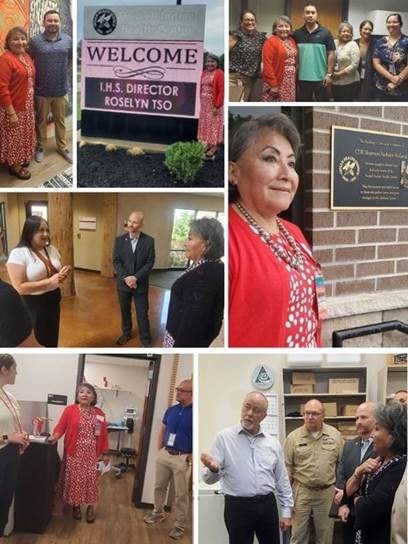
Director Tso visited the White Cloud Health Center in White Cloud, Kansas, to learn about their personal efforts to improve the health of their patients. She was particularly encouraged by their “Food is Medicine” promotion. At IHS, we work in collaboration with U.S. Department of Health and Human Services to support and encourage community-led strategies, like those as White Cloud, that promote food sovereignty and thereby nurture a health care system that prioritizes holistic, preventive care rooted in traditional dietary practices.
While in Kansas, Ms. Tso also visited Hunter Health in Wichita, who places patients at the center of their circle of care. It’s the type of patient-centered approach we support and promote through our efforts at the IHS. As an urban Indian health program, they take immense pride in providing the Wichita community with quality, comprehensive health care across three clinics. Ms. Tso thanks the Hunter Health staff and leadership for spending time with myself and Oklahoma City Area Director Rear Adm. Travis Watts.
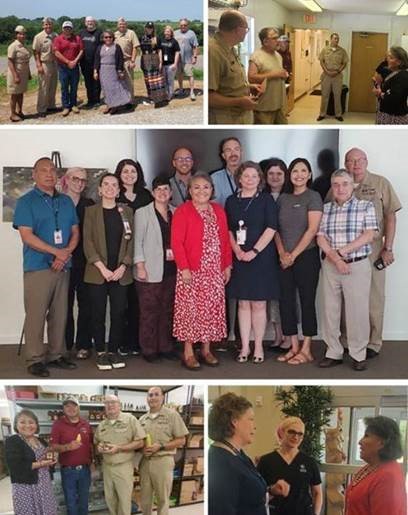
On July 18, Director Tso attended the Oklahoma City Area Director’s Awards ceremony. “I am always thrilled and encouraged to see our committed dedicated health care professionals receive well-deserved recognition for their exemplary work and dedication to the mission of the IHS,” she said.
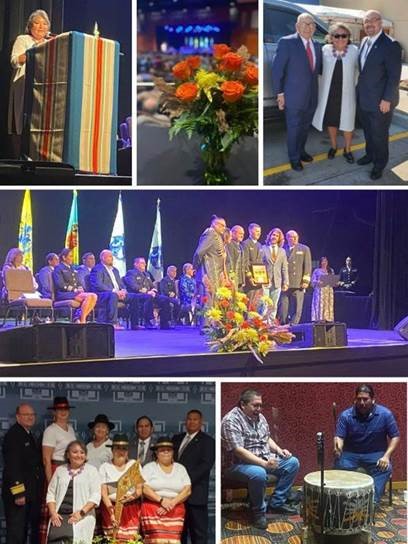
As Ms. Tso concluded her Oklahoma City Area IHS site visits, she recognized the efforts of the Watonga Indian Health Center in Watonga, Oklahoma, and the Watonga Food Distribution Program. Overseen by the Cheyenne and Arapaho Tribes, the health center provides high-quality and accredited health care services to a rural community of 4,500 patients, including behavioral health, dental, general medical care, and public health nursing. Their services focus on prevention, restoration, and collaborative relationships that are valued and “exceed the needs” of their patients, community, and tribal partners. The Director offers her appreciation to the health center's professional staff for taking time from their busy schedules to share their comprehensive and compassionate care.
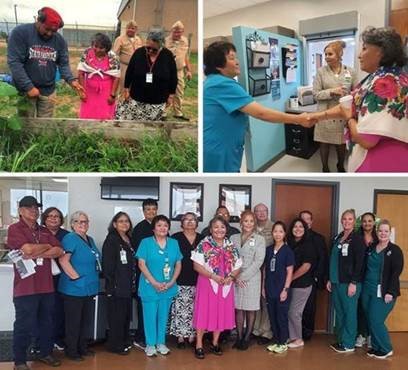
A highlight of Ms. Tso’s trip to the Oklahoma City Area was participating in the agency’s first Purchased/Referred Care listening session, summarized below.
PRC Listening Session Held in Oklahoma
On July 17, Director Tso joined tribal leaders and patients at the agency’s first Purchased/Referred Care listening session in Concho, Oklahoma. The event had a great turnout, with close to 75 people in attendance and dozens more participating virtually. After providing updates about the PRC program, participants broke into smaller groups for focused discussions with IHS staff. Ms. Tso visited each breakout group and heard incredible feedback. The two-way communication and recommendations are crucial in helping the IHS improve customer service through the PRC program. It also enhances our collaborative efforts to better meet patient’s needs across Indian Country. The Director extends her thanks to Cheyenne and Arapaho Tribes Governor Reggie Wassana and his staff for hosting this important event. She also thanks Capt. Joe Bryant and his team, who are making incredible strides to transform and update our PRC program.
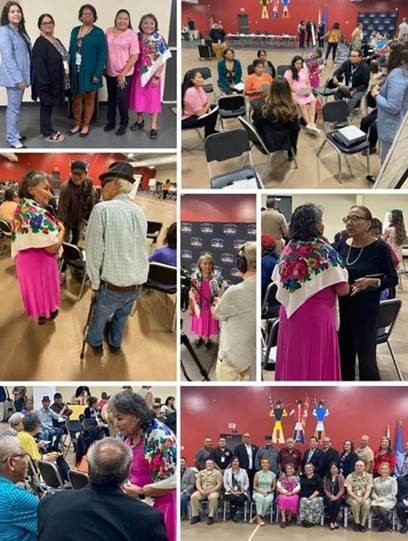
Meeting with the Lummi Nation to Discuss the Impact of Fentanyl and Opioid Crises
Earlier this month, IHS leadership held a tribal delegation meeting with Lummi Nation leadership to discuss the impact of the fentanyl and opioid crisis and how we can assist their efforts to combat these challenges. The IHS is committed to help overcome challenges and will continue to work with other agencies to aggressively leverage funding to use in combating this crisis in the Portland Area and throughout Indian Country. Director Tso was honored to be gifted a blanket from Lummi Nation Councilwoman Darci Bob. Ms. Tso looks forward to continued collaboration with the Lummi Nation on this effort.
The Director was also a keynote speaker at the Idaho Hispanic/American Indian Healthcare Conference hosted by the Idaho Commission on Hispanic Affairs. It was the second conference held in the state of Idaho to discuss and address health care issues facing communities of color. She provided an overview of the IHS mission and spoke about the importance of coming together and recognizing different cultures. Ms. Tso thanks Executive Director Margie Gonzalez for the opportunity to share insights about the IHS and the communities we serve and looks forward to further discussions on collaborations and building a partnership.
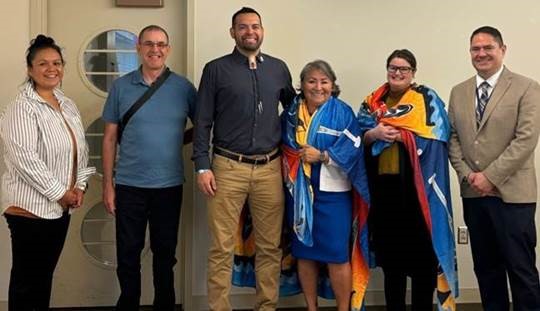
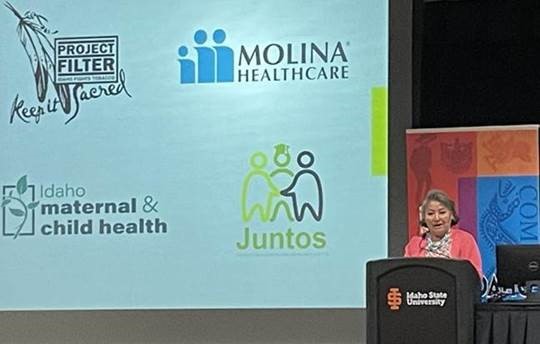
Indian Self-Determination and Education Assistance Act Negotiator’s Meeting
On July 11, Director Tso spoke with the IHS ISDEAA negotiators in Billings, Montana. One of the agency’s top operational priorities included in the Agency Work Plan is improving ISDEAA operations. This in-person meeting was a follow-up to February’s ISDEAA negotiators meeting that focused on issues that have a nationwide impact, with an emphasis on Contract Support Costs and implementing the recent decision by the Supreme Court of the United States. The meeting provided senior leadership, area directors, ISDEAA negotiators, the Office of Direct Service and Contracting Tribes, the Office of Tribal Self-Governance, and the Office of General Counsel with opportunities to discuss topics related to human resources, section 105(l) leases, finance and accounting, and more.
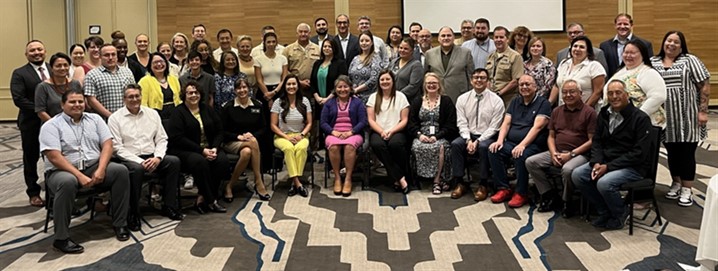
Feedback from Recent Visit to TGCNM Inspires Using Pronouns in Professional Communications
In June, Director Tso visited the Transgender Resource Center of New Mexico (TGCNM). As providers of health care, she said we need to be aware that the same health disparities experienced throughout Indian Country are often exacerbated in the transgender community due to prejudice, discrimination, and violence.
Far too many of our transgender relatives would rather forego seeking care than trust systems that have historically made them feel disrespected, judged, mistreated, and unsafe. Heeding TGCNM staff input and honoring their willingness to share what were often painful recollections, the Director is asking all staff of the IHS to adopt the practice of including pronouns in professional communications, starting with email signatures.
In the spirit of One IHS, adopting this practice across all areas and positions affords everyone the most basic level of respect and inclusiveness. It steers us away from making incorrect assumptions that can prove harmful and inflict distress. Ms. Tso encourages everyone to explore the myriad of ways we can build upon this first step, from including pronouns in on our Teams screennames and adding into routine introductions during in-person meetings, to seeking further training on the specific health care needs of our transgender relatives.
She hopes you will join in celebrating this modest initial action that better aligns us with our agency values, adheres to U.S. Department of Health and Human Services policy, and brings us all under the umbrella of One IHS.
Read more about this experience—and see a good example of how to format your email signature—in a new blog post from Director Tso.
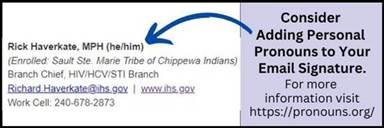
IHS-EPA Strengthen Solid Waste Management Collaborations
In July, Director Tso met with Environmental Protection Agency Assistant Administrator Jane Nishida to discuss an issue critical to the health and sustainability of tribal communities—the safe disposal of solid waste. It followed their meeting on April 8 that looked at the longstanding partnership of the agencies and shared efforts to enhance the environmental health conditions of American Indian and Alaska Native communities. The collaborative efforts thus far have been important for coordination of water, wastewater, and solid waste infrastructure, as well as technical assistance. This cooperation is grounded in MOU agreements dating back to 1988, underscoring our commitment to the Clean Water Act Set-Aside Program and the Safe Drinking Water Act Amendments of 1996, and support for Executive Order 14112.
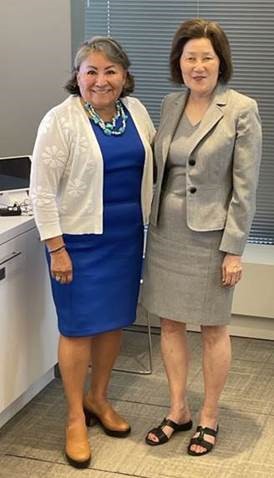
Naloxone Available for Federal, Tribal and Urban Sites
The Indian Health Service supports expanding harm reduction activities and work to promote low-barrier access to naloxone, a medicine that rapidly reverses an opioid overdose. As part of a collaborative pilot project between the IHS National Committee on Heroin Opioids and Pain Efforts (HOPE) and the Division of Behavioral Health, a limited amount of naloxone is available for federal, tribal, and urban sites struggling to meet the demand. These doses can augment existing naloxone programs that experience unexpected shortfalls. For more information, including the application process, please email IHSHOPECommitteeLeadership@ihs.gov.
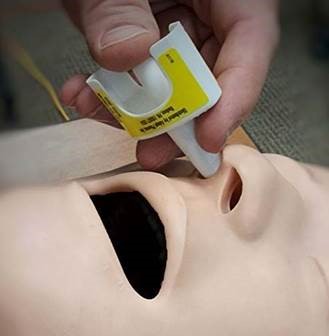
USPHS Commissioned Corps Anniversary
Director Tso recognized our U.S. Public Health Service Commissioned Corps officers across the IHS as the agency celebrated the anniversary of the Commissioned Corps of the United States Public Health Service on July 16. The IHS employs more Commissioned Corps officers than any other agency in the federal government. For more than 200 years, men and women have served on the front lines of our nation’s public health to fight disease, conduct research, and care for patients in underserved communities across the nation and throughout the world. The work of the U.S. Public Health Service is crucial to the IHS mission, as we work together to deliver health care to approximately 2.8 million American Indians and Alaska Natives across the country. We are grateful for your service!
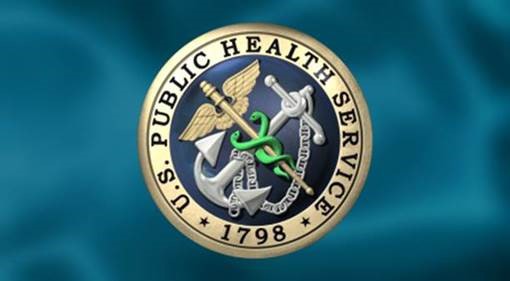
IHS Launches Updated Website Dedicated to Two-Spirit and LGBTQI+ Issues
This month in the IHS blog, National HIV & Hepatitis C Program Consultant Rick Haverkate announced the release of the updated webpage dedicated to Two-Spirit and LGBTQI+ issues. This revamped resource is designed to be a comprehensive hub for information, support, and advocacy. It offers educational materials, health care resources, and community support networks tailored specifically for Two-Spirit and LGBTQI+ individuals. The updated webpage is a testament to our commitment to ensuring accessibility and inclusivity, providing a digital space where individuals can find the support they need, free from judgment and discrimination.
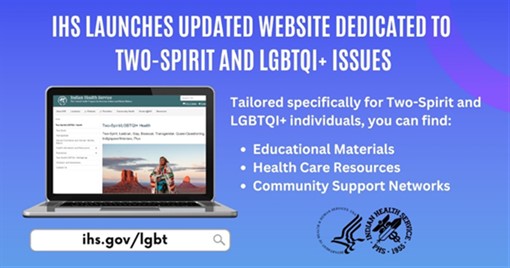
Funding Awarded to Develop and Improve Access to Public Health Services
Last week, IHS announced the award of $24.5 million in grants to 23 tribes, tribal organizations, and urban Indian organizations for a three-year competitive grant program to develop and improve access to public health services. The grant program is comprised of two initiatives to enhance public health. One initiative, the Native Public Health Resilience Program, seeks to expand public health services by supporting tribes, tribal organizations, and urban Indian organizations in implementing core public health functions, services, and activities, and to further develop and improve their public health management capabilities. The other initiative is the Native Public Health Resilience Planning Program. It is designed to assist tribes, tribal organizations, and urban Indian organizations to establish goals and performance measures, assess their current management capacity, and determine if developing a public health program is practicable.
These grants will support our core strategic goal of ensuring that comprehensive, culturally appropriate personal and public health services are available and accessible to the American Indian and Alaska Native communities that we serve. Read the full list of grant recipients here.
Executive Development Program Conducts Third Session in Albuquerque
Earlier in July, the IHS Executive Development Program held its third session in Albuquerque, New Mexico, at the National Indian Programs Training Center. The program closely aligns with a goal of the IHS Strategic Plan to develop a highly skilled and adaptable workforce. The week kicked off on Monday with a welcome by the IHS executive leadership team and an insightful panel discussion on “Organizational Leadership at IHS.” On Tuesday, participants explored different leadership styles and their impact on organizational climate. Wednesday and Thursday focused on developing an inspired culture, with sessions on leading in a changing workplace and building a creative team. The week concluded on Friday with a forward-looking session on mentoring, coaching, and leveraging power and influence to transform the organization.
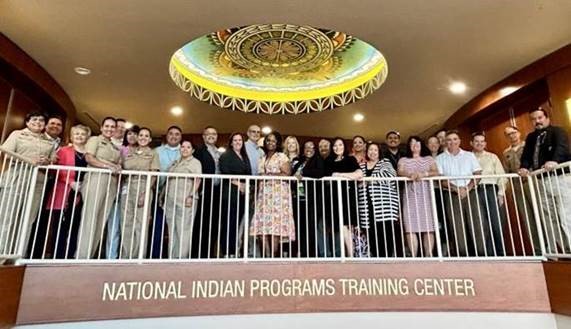
Chickahominy Indian Tribe Hosts HHS Region 3 Tribal Consultation
Deputy Director Benjamin Smith provided remarks at the HHS Region 3 Tribal Consultation on July 16 – 17. The Chickahominy Indian Tribe, one of the seven recently federally recognized tribes in Virginia, hosted the event in Providence Forge, Virginia. Deputy Director of Management Operations Darrell LaRoche and Dr. Beverly Cotton accompanied Smith at the event.
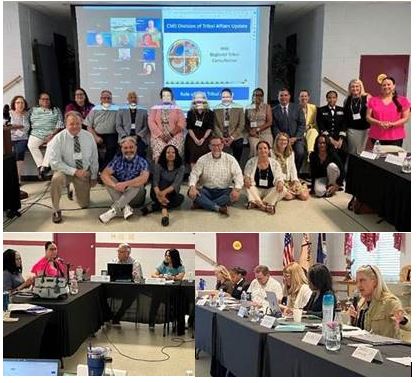
IHS Leadership attends Nansemond Indian Nation Clinic Opening
Last week, Benjamin Smith also provided remarks to celebrate the Nansemond Indian Nation grand opening of Fishing Point Healthcare’s new health clinic and pharmacy in Portsmouth, Virginia. In his remarks, Smith recognized Chief Keith Anderson, FPHC Board Chairman David Darling, and Portsmouth Mayor Shannon Glover for their support of the event. Deputy Director of Management Operations Darrell LaRoche and Nashville Area Director Dr. Beverly Cotton also attended the event. Nansemond Indian Nation is one of the recently federally recognized tribes in Virginia. Their dedication to the health and well-being of the Portsmouth community delivers an integrated health care model offering medical, dental, physical therapy, pharmacy, lab, and radiology services. Smith extended his heartfelt gratitude to the leaders and visionaries who championed this cause and shaped the development of the facility.
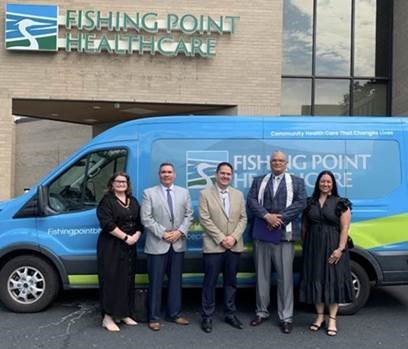
(Left to Right) Office of Finance & Accounting Director Jillian Curtis, Darrell LaRoche, Benjamin Smith, Nansemond Indian Nation Chief Keith Anderson, and Dr. Beverly Cotton
IHS Launches Online Map of Forensic Health Care Programs
The IHS senior leadership team extends a thank you to everyone across the IHS system, including our community and tribal and urban Indian partners, for your ongoing collaborative work and dedication to preventing violence within our Native communities. Last year, the White House drafted the first-ever U.S. National Plan to End Gender-Based Violence: Strategies for Action. Uniquely aligned with this plan and in support of the strategy’s action items, the IHS has outlined a response, which highlights and captures the various strengths-based active programs, strategic plan initiatives, projects, or committee work which places great emphasis on gender-based violence prevention efforts conducted by the IHS. To read more about the IHS plan in response to the national plan, click here.
Are you interested in raising awareness and supporting prevention efforts to help eradicate gender-based violence? Reach out to Forensic Nurse Consultant Nicole Stahlmann to learn more about the various free training opportunities; visit the recently updated IHS Forensic Healthcare Webpages; and check out the new interactive map that houses each of the active forensic healthcare programs across the Indian health system.
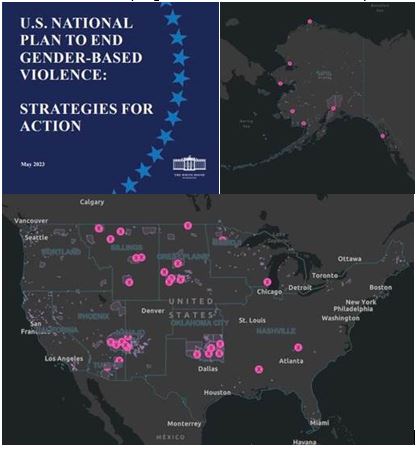
IHS Welcomes Two Tribe and Tribal Organizations into Self-Governance
Recently, the IHS welcomed two new tribes and tribal organizations into the IHS Tribal Self-Governance Program. The Great Plains Tribal Leaders Health Board, located in the Great Plains Area, and the Eastern Shoshone Tribe, located in the Billings Area, entered into self-governance compacts and funding agreements as authorized by Title V of the Indian Self-Determination and Education Assistance Act. In making this transition, they join more than 385 federally recognized tribes participating in the IHS Tribal Self-Governance Program, which provides tribes or authorized tribal organizations the option to assume IHS program funds and manage them to best fit the needs of their beneficiaries.
IHS Invited to Participate in the “New” Diabetes Management Collaborative
The U.S. Centers for Disease Control and Prevention’s Division of Diabetes Translation invited the IHS Division of Diabetes Treatment and Prevention to be a founding member of the new Diabetes Management Collaborative. The DMC has brought together leading federal agencies, organizations, and individuals to play a leading role in crafting a vision for national action on diabetes management. This vision will help accelerate progress and transform outcomes for people with diabetes in the United States. The DMC is designed to focus on equity and medically underserved communities. DDTP Director Carmen Licavoli Hardin attended the launch of the DMC at a forum in Chicago on June 13 – 14. The forum worked on developing a national strategic plan for the DMC that contains goals and objectives for diabetes treatment and prevention focusing on equity. Themes from the two-day forum included Centering Equity, DMC Vision, and DMC Priorities and Taking Action.

IHS and CDC Offer Virtual Training for Infection Control
The Indian Health Service has partnered with the U.S. Centers for Disease Control and Prevention to provide virtual infection control training for all health care employees. Topics include Risk Recognition, Hand Hygiene and Personal Protective Equipment, Bloodborne Pathogen Exposure Prevention, Cleaning and Disinfection, IHS Indian Health Manual Chapter 3-33 Infection Control and Prevention Policy, and CDC Infection Prevention and Control Core Practices. This training will be held for five consecutive weeks starting on July 10. A different subject will be covered weekly with time for Q&A at the end of each session. Register here.
Indian Health Geriatric Nurse Fellows Meet in Rockville for Culminating Event
Staff from the Division of Nursing Services, Division of Clinical and Community Services, and members of the National Nursing Leadership Council gathered in Rockville on July 16 with the first cohort of Geriatric Nurse Fellows. Fourteen fellows shared findings from their local projects in a blend of in-person and virtual presentations. Their four-month projects were selected based on local needs and interests. Topics ranged from sexually transmitted infection health education for older adults to dementia screening. Medication reconciliation and polypharmacy-related were the most popular topics. A fireside chat with a nursing leadership panel also included tips for “keeping the fire burning” in their geriatric work.
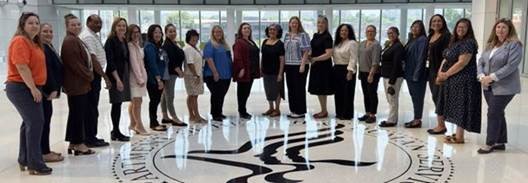
Geriatric Nurse Fellows with DNS, DCCS, and NNLC meeting participants
Division of Nursing Services Meets at IHS Headquarters
This week, the Division of Nursing Services Executive Team met at IHS headquarters in Rockville, Maryland. The team's primary focus was to update the DNS Strategic Plan by identifying outcome measures and goals. The DNS team also supported the Geriatric Nurse Fellows by attending their local project presentations. For the remainder of the week, the DNS team participated in the National Nurse Leadership Council meeting.
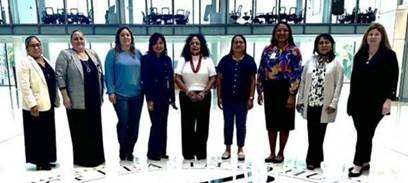
United States Public Health Service Scientific and Training Symposium
On June 24 – 27, Health Professions Support Branch Chief Ra’el Augare, Program Specialist Lisa Smith, a Uniformed Services University student, Ensign Apurva Chavali, and other staff members attended the United States Public Health Service Scientific and Training Symposium in Jacksonville, Florida. The IHS was a Gold Sponsor of the event. The mission of the symposium is to strive to build leadership in public health through advocacy, education, research, partnerships, and program support. It generated a presence of USPHS Commissioned Corps officers, USU students, and other attendees across the country. Individuals expressed an interest in employment with joining IHS as a USPHS Commissioned Corps officer, Loan Repayment Program options, and opportunities to provide direct patient care to American Indians and Alaska Natives while fulfilling their duties. Due to hard work and dedication to the IHS, Augare was awarded with a coin from Deputy Surgeon General Rear Adm. Denise Hinton.
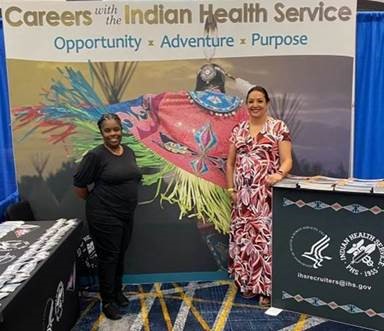
Lisa Smith and Ra’el Augare at the U.S. Public Health Service Scientific and Training Symposium
Division of Diabetes Treatment and Prevention Webinar Series
The IHS Division of Diabetes Treatment and Prevention: Advancements in Diabetes Webinar Series is hosting the following webinar for health care providers:
- “Our Prayer: Healthy Future Generations as a Result of the Healthy Diné Nation Act of 2014” on July 24 at 3:00 p.m. ET. Click here to attend.
Telebehavioral Health Center of Excellence Webinar Series
The Telebehavioral Health Center of Excellence Tele-Education Program is hosting the following trainings for health care providers:
- TBHCE Webinar Series: “Lessening Harms and Preventing Future Risk: Lethal Means Restriction Counseling” on July 30 at 12:00 p.m. ET ?Register here
- Pain and Opioid Disorder Webinar Series: “Advancing Opioid Stewardship — Leveraging Local Strategies to Save Lives” on August 5 at 2:00 p.m. ET. ? Register here
- TBHCE Webinar Series: “Youth Social Media, Suicidality and the LGBTQ Community” on August 13 at 12:00 p.m. ET ?Register here
- Behavioral Health Integration Webinar Series: “Evaluation Approaches and Sample Findings: Integrated Care in AI/AN Communities” on August 15 at 12:00 p.m. ET ?Register here
- Behavioral Health Integration Webinar Series: “Partnerships for Children and Adolescents in Integrated Care Settings” on August 27 at 12:00 p.m. ET ?Register here
IHS Blogs
Subscribe to the IHS blog by providing your name and email address in the “Stay Connected” box.
- IHS Releases Updated Webpage Dedicated to Two-Spirit and LGBTQI+ Issues
- Incorporating Pronouns into Professional Communications at the Indian Health Service
Social Media
Follow IHS on Twitter, Facebook and LinkedIn to see more of what the IHS is doing in your community and around the country. You can also follow the IHS Director on Facebook and Twitter.



